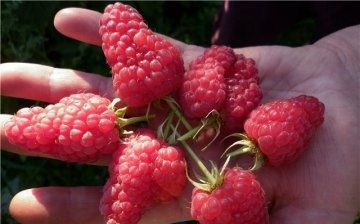Raspberry large-fruited, traditional and remontant
Raspberry is a deciduous shrub with a perennial rhizome from which shoots grow. Raspberries differ not only in the taste of berries, but also in the fact that they are useful, they contain a lot of vitamins and microelements that we need. Raspberries are not a high-calorie berry, suitable for people with diabetes and obesity. Raspberries can be used in any form for many diseases.
Raspberries are of different types, there are large-fruited, traditional and remontant raspberries.
Large-fruited raspberries have a lot of advantages and, first of all, these are large berries, up to 4 grams each. Some single berries can even reach 20 grams in weight. Secondly, the large-fruited raspberry itself is very decorative, thanks to its branched branches and large beautiful berries. And, thirdly: large-fruited raspberries have a wonderful aroma and taste.
Traditional raspberries are reliable varieties, but their disadvantage can be called low yield, although they perfectly tolerate various climatic changes and can grow in any, practically, conditions and on different soils.
Repaired raspberries give berries until the very frost, the berries of the second wave can be even tastier and more than the first. Due to the fact that such raspberries constantly bear fruit, gardeners have time to feast on it and prepare it for future use.
Each type of raspberry has different varieties, which can be sweet and sour or sweet, late or early, with black or red or yellow berries. You can also find varieties that can withstand the most unpleasant and common raspberry diseases (anthracnose, botrytis, powdery mildew, etc.).
In order for any type of raspberry to give a decent harvest, raspberries need to be carefully looked after: to deal with pests, weeds and plant diseases, loosen the soil, remove weak, diseased, damaged shoots, cut the raspberry bush correctly and in time, feed it correctly, install supports to prevent breaking off branches and, of course, water regularly.



